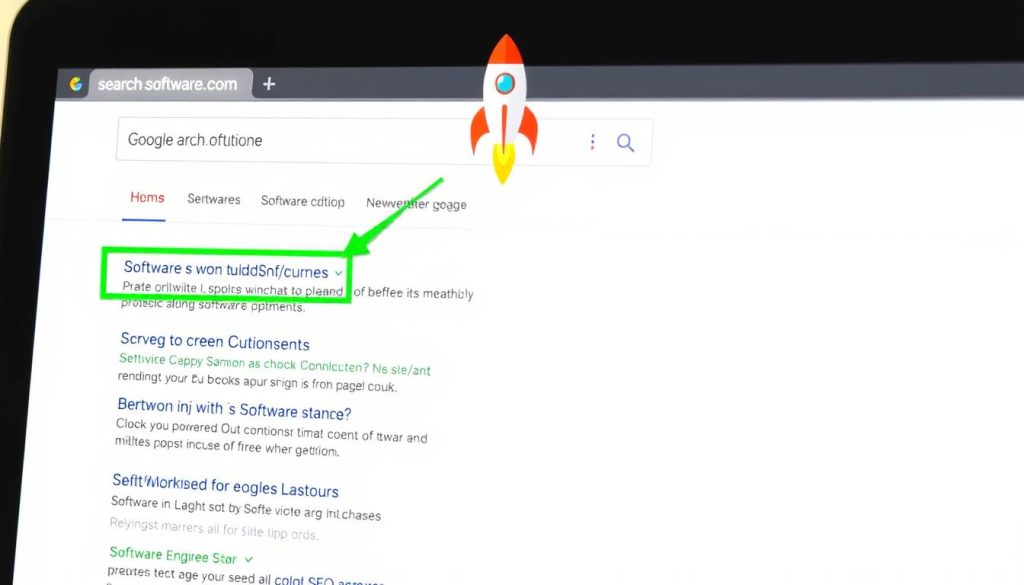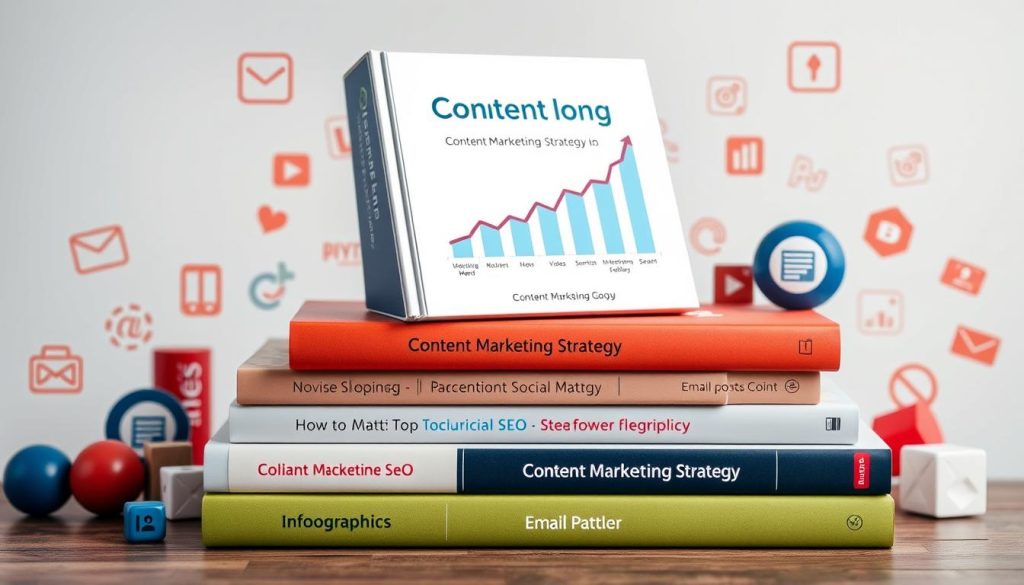Promoting software in a competitive market can be tough, especially with limited resources. But don’t worry! With smart strategies, you can boost your reach and grow your business. Let’s explore effective tactics to help your software shine in the digital world.
We’ll cover ways to connect with your audience, improve online visibility, and showcase your product’s value. These methods will help you stand out, even on a tight budget.
Key Takeaways
- Leverage social media platforms to connect with your target audience
- Optimize your online presence for improved search engine visibility
- Collaborate with influencers and industry bloggers to expand your reach
- Offer free trials and demos to showcase the value of your software
- Utilize email marketing to nurture leads and build customer relationships
Leverage Social Media Platforms
Social media offers a powerful way to connect with your target audience. These digital channels help showcase your software’s features and benefits. You can effectively promote your unique value proposition at a low cost.
Twitter for Targeted Outreach
Twitter is a valuable tool for software marketing. Use it for targeted outreach to industry influencers and potential customers. Share informative content and respond to queries to engage your audience.
Take part in industry-specific conversations on Twitter. Use its search capabilities to find people who could benefit from your software.
Facebook Groups and Communities
Facebook communities help build relationships and showcase your software. Join relevant industry groups and share valuable insights. Answer questions and highlight your software’s capabilities to establish trust.
This approach positions your brand as a knowledgeable resource. It drives software promotion and potential conversions among engaged audiences.
| Social Media Platform | Key Benefits for Software Promotion |
|---|---|
|
|
| Facebook Groups and Communities |
|
Effective use of social media can boost your software promotion efforts. It helps you reach your target audience and drive meaningful engagement. This can lead to potential conversions and business growth.
Optimize for Search Engine Visibility
Boosting your software’s online visibility is crucial. This involves careful keyword research and applying on-page SEO best practices. These steps help make your software easy to find.
Keyword Research and Optimization
Find out what terms your target audience searches for. Use keyword tools to discover relevant, high-volume software SEO keywords. Add these keywords to your website, content, and metadata.
This strategy improves your search rankings and boosts visibility. It helps more people find your software online.
- Analyze your target audience’s search behavior and pain points.
- Conduct keyword research to find the most relevant and high-volume terms.
- Optimize your website, content, and metadata with the identified keyword research for software promotion.
On-Page SEO Best Practices
Follow on-page optimization for software best practices to boost search visibility. Optimize page titles, meta descriptions, and header tags. Improve your content structure for better user experience.
These steps show search engines that your content is relevant. They help your software stand out in search results.
- Craft compelling and keyword-rich page titles and meta descriptions.
- Utilize header tags (H1, H2, H3) to structure your content effectively.
- Optimize your website’s loading speed and mobile-friendliness.
- Ensure your content is informative, engaging, and valuable to your audience.
Using these software SEO strategies can boost your website’s visibility. You’ll attract more qualified traffic to your software solution. This approach helps grow your online presence effectively.

How To Promote Software With Limited Resources
Promoting software on a tight budget can be challenging. But don’t worry! There are many cost-effective strategies to reach your target audience. Let’s explore some proven tactics for software growth without overspending.
Software promotion on a budget requires creative growth-hacking techniques. Harness the power of social media platforms like Twitter, Facebook, and LinkedIn. These tools can be great for cost-effective software marketing.
Engage with your audience and share valuable content. Partner with influencers to boost your reach without spending much. This approach can amplify your message effectively.
Another key aspect is optimizing your online presence for search engines. Do thorough keyword research and use on-page SEO best practices. This can improve your software’s search ranking and drive organic traffic.
- Leverage social media platforms for targeted outreach and engagement
- Optimize your website and content for improved search engine visibility
- Collaborate with industry influencers and bloggers to expand your reach
- Offer free trials and demos to attract and convert potential customers
- Utilize email marketing to nurture leads and build long-term relationships
These software promotion on a budget strategies can help market your product effectively. Focus on being creative and resourceful. Target your audience precisely for successful cost-effective software marketing.
“Effective software promotion doesn’t have to cost a fortune. With the right growth hacking tactics, you can achieve remarkable results on a shoestring budget.”
Collaborate with Influencers and Bloggers
Influencer marketing and blogger outreach can revolutionize your software promotion strategy. By partnering with industry figures, you can access their audiences and leverage their credibility. This approach taps into established trust and expands your reach.
For influencer marketing for software, find influential bloggers and experts aligned with your target audience. Explore collaborations like product reviews, guest posts, or joint promotional campaigns. These partnerships can introduce your product to new potential customers.
Blogger outreach for software promotion offers multiple benefits. It exposes your product to new audiences and builds trust through endorsements. Collaborating with industry bloggers can enhance your software endorsements and attract qualified leads.
Carefully research potential influencers and bloggers before partnering. Look for those genuinely interested in your niche with engaged followings. Ensure they have a strong track record of successful collaborations.

“Collaborating with industry-leading bloggers and influencers has been a game-changer for our software promotion strategy. The reach, credibility, and trust they bring to the table are invaluable.”
Effective influencer marketing for software requires a strategic approach. Select partners carefully and create compelling campaigns. This method can boost awareness, generate leads, and increase your software’s success.
Offer Free Trials and Demos
Free trials and demos can be game-changers for software companies. They allow potential customers to experience your product firsthand. This hands-on approach showcases key features and benefits, making it easier for users to see the value.
Create Compelling Landing Pages
The quality of your software landing pages is crucial for successful free trials and demos. These pages should captivate your audience and drive conversions. Use software landing page optimization techniques to make your pages visually appealing and informative.
Ensure your landing pages are easy to navigate. Highlight the most compelling features of your software. Emphasize the benefits users will experience from using your product.
- Highlight the most compelling features of your software
- Emphasize the benefits users will experience
- Provide clear and concise instructions for signing up
- Incorporate eye-catching visuals and multimedia
- Optimize the pages for search engine visibility with relevant software free trials and software demos keywords
Software free trials and software demos give potential customers hands-on experience with your product. This approach helps them make informed decisions. Compelling landing pages effectively promote your software and showcase its value.
“Providing a free trial or demo is one of the best ways to showcase the value of your software and convert potential customers into loyal users.”
Utilize Email Marketing
Email marketing is a powerful tool for software promotion. It helps you connect with your target audience directly. You can deliver personalized content and offers, guiding customers through the sales process.
Software email marketing builds stronger relationships with potential and existing customers. It’s an effective way to boost conversions and grow your business.
Build and Segment Email Lists
Successful email marketing starts with effective email list building for software. Create opt-in channels like lead magnets and signup forms. These will help you gather contact information from interested people.
Email segmentation for software is the next crucial step. Divide your subscribers into groups based on their interests or demographics. This allows you to craft messages that resonate with each segment.
- Utilize lead magnets, such as e-books or exclusive content, to incentivize email signups.
- Segment your email list based on factors like job title, industry, or product interest.
- Personalize email content and offers to match the specific needs and pain points of each segment.
“Email marketing continues to be one of the most effective digital marketing channels, delivering impressive ROI for software businesses that leverage it effectively.”
Investing in email list building for software creates a solid foundation for your marketing strategy. Combining this with email segmentation for software enhances your campaign’s effectiveness.
This approach drives engagement and boosts conversions. It also fosters long-term customer loyalty for your software products.

Attend Industry Events and Conferences
Software industry events offer valuable networking opportunities. These software industry events and software trade shows connect you with potential customers and partners. You can also meet industry influencers at these gatherings.
Networking Opportunities
Software conference networking events help build meaningful connections. They strengthen your presence in the software community. These events can be in-person or virtual.
Here are some tips to make the most of networking opportunities:
- Research the attendee list and identify key individuals or companies you want to connect with. Prepare a brief introduction and conversation starters.
- Actively engage with other attendees during breaks, social events, or scheduled networking sessions. Be an active listener and show genuine interest in their work and needs.
- Collect business cards and follow up with new contacts after the event, offering to provide more information about your software or arranging a meeting.
- Participate in panel discussions, workshops, or roundtables to demonstrate your expertise and build relationships with industry peers.
Industry events can elevate your brand and gather valuable insights. They help forge strategic partnerships that drive growth. Attending these events can boost your software business’s success.
“Attending industry events and conferences has been instrumental in expanding our software business. The networking opportunities and exposure to potential customers have been invaluable.” – John Smith, CEO of XYZ Software Solutions
Leverage Content Marketing
Content marketing is a powerful strategy to attract your target audience. It’s cost-effective and engaging. Create informative content like blog posts, tutorials, webinars, or videos to address customer needs.
This approach can drive potential customers to your software solution. It showcases your expertise and product value.
Create Informative and Engaging Content
Content marketing for software thrives on quality and relevance. Produce software educational content that informs your audience. Use software blog and video content to reach people on various platforms.
Focus on addressing your audience’s specific challenges. This shows your deep understanding of the industry.
- Identify your target audience’s pain points and create content that addresses their specific needs and challenges.
- Produce high-quality, educational content that demonstrates your deep understanding of the industry and your software’s capabilities.
- Optimize your content for search engines to improve its visibility and attract organic traffic to your website.
- Leverage different content formats, such as blog posts, case studies, videos, and webinars, to cater to various learning preferences.
- Continuously monitor the performance of your content and make data-driven adjustments to ensure maximum impact and engagement.
| Content Type | Key Benefits | Examples |
|---|---|---|
| Blog Posts | Establish thought leadership, drive organic traffic, and nurture leads | How-to guides, industry insights, software comparisons |
| Webinars | Provide in-depth product demonstrations, build trust, and generate leads | Product deep-dives, industry trends, software implementation best practices |
| Video Content | Engage audiences, showcase product features, and improve brand awareness | Explainer videos, product walkthroughs, customer testimonials |
Content marketing for software creates a sustainable strategy for growth. It attracts new customers and keeps existing ones engaged. Use software educational content to establish your product as a trusted solution.
Software blog and video content can help you stand out in the market. It’s a powerful tool for showcasing your expertise.

“Content marketing is the future of marketing. It’s about creating valuable, relevant, and engaging content that your target audience will love.”
Encourage User Reviews and Testimonials
Positive software user reviews and software customer testimonials can greatly sway potential buyers’ decisions. These experiences build software social proof and attract new users. Encourage your current users to share feedback about your software.
Showcase these software user reviews and software customer testimonials on your website and social media. This approach proves your software’s value and reliability to potential customers. Such social proof can overcome doubts about your product.
- Actively request feedback and reviews from your satisfied customers
- Curate the most impactful and representative software user reviews and software customer testimonials
- Prominently display these software user reviews and software customer testimonials on your website, landing pages, and social media profiles
- Encourage users to share their experiences on popular review platforms, such as G2 and Capterra
Use software user reviews and software customer testimonials to build trust and credibility. This software social proof can boost conversions and sales for your software product.
“The customer support team was incredibly responsive and helpful, and the software has significantly improved our workflow. I highly recommend this product.”
Conclusion
We’ve explored strategies to promote your software effectively with limited resources. You can reach your target audience using social media, SEO, and influencer collaborations. Free trials, email marketing, and industry events also help drive growth.
Effective software promotion combines multiple strategies to boost visibility and attract users. Be resourceful and adaptable in your marketing efforts. This approach will help you promote your software products successfully.
The techniques in this article guide you through software marketing on a budget. They also cover best practices and growth strategies. Stay committed to your goals and explore new ways to reach your audience.




